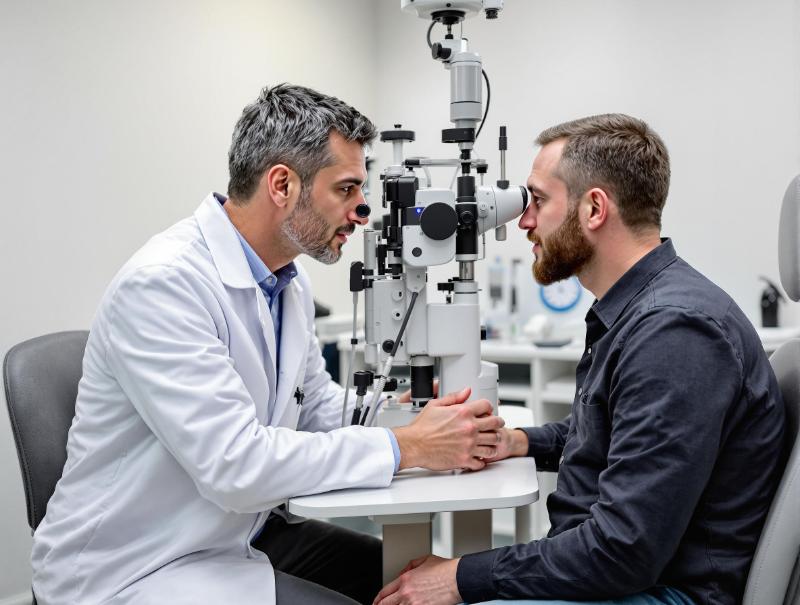Are Corneal Ulcers Contagious? Answers from London Eye Doctors

A red, painful, or irritated eye can be alarming, especially when the cause is a corneal ulcer, a serious condition that can threaten your vision if left untreated. If you or someone close to you has been diagnosed with one, a common question is: Are corneal ulcers contagious?
To answer this properly, we consulted London-based eye specialists and reviewed the latest clinical insights. Here’s what you need to know about what a corneal ulcer is, how it spreads (or doesn’t), and how to protect your eyes and those around you.
What Is a Corneal Ulcer?
A corneal ulcer is an open sore on the cornea — the transparent front part of the eye covering the iris and pupil. It often results from an infection but can also arise due to trauma, dry eye, or prolonged contact lens wear.
Symptoms typically include redness, discomfort or pain, blurred vision, light sensitivity, and sometimes a visible white or grey spot on the cornea. Excessive tearing or discharge may also be present. Because corneal ulcers can worsen quickly and lead to scarring or permanent vision loss, they are considered an ocular emergency.
Are Corneal Ulcers Contagious? The Short Answer
The ulcer itself is not contagious. You cannot “catch” a corneal ulcer simply by being near someone with one. However, the underlying cause of the ulcer may be infectious, involving bacteria, viruses, or fungi, and some of these pathogens can be transmitted under certain conditions.
Understanding Infectious Causes
Bacterial corneal ulcers are often linked to poor contact lens hygiene, such as sleeping in lenses or inadequate cleaning. Although the bacteria responsible aren’t usually spread through casual contact, they can be transferred via contaminated objects or poor hygiene practices.
Viral ulcers, most commonly caused by the Herpes Simplex Virus (HSV), present a slightly different scenario. HSV can be spread through direct contact, particularly if there’s an active cold sore or contaminated eye drop bottles. Yet, corneal ulcers caused by HSV usually arise from a reactivation of a prior infection, rather than direct eye-to-eye transmission.
Fungal ulcers, which are rarer and often occur after eye trauma involving plant material, and Acanthamoeba keratitis, linked to exposure to contaminated water, are not transmitted between people but are environmental risks.
When Is Transmission Possible?
Although the ulcer itself can’t be passed on like a cold, certain behaviours can increase the risk of spreading the infectious agents responsible. Sharing eye drops, towels, or contact lenses, or handling someone’s infected eye with unclean hands, may facilitate transmission of bacteria or viruses. Therefore, strict hygiene is essential, especially in households or clinics caring for someone with an active eye infection.
Who Is Most at Risk?
Corneal ulcers are most common among contact lens wearers, particularly those not following recommended hygiene practices. Other risk groups include people with dry eye syndrome, those who have suffered eye injuries, individuals with weakened immune systems, and people living in warm, humid climates where fungal infections are more prevalent. In London’s urban environment, bacterial infections linked to contact lens use remain the most frequent cause.
Diagnosis and Treatment
A prompt diagnosis is critical. Eye specialists use a slit-lamp examination and fluorescent dyes to identify the ulcer. They may also take swabs to determine the exact infectious agent.
Treatment varies depending on the cause: bacterial ulcers require intensive antibiotic drops, viral ulcers are treated with antiviral medications, and fungal infections need antifungal eye drops. Some cases, such as Acanthamoeba keratitis, may require a combination of therapies and can be challenging to treat. Early intervention often leads to full recovery, though severe ulcers may result in scarring or vision impairment.
Preventing Corneal Ulcers
Prevention revolves largely around good hygiene and eye care habits. Contact lens users should never sleep in lenses unless advised by their eye doctor, always wash their hands before handling lenses, disinfect lenses regularly, and avoid swimming or showering while wearing lenses. More broadly, avoid rubbing your eyes excessively, never share eye drops or towels, and seek prompt medical attention for any eye discomfort or injury.
When to See a Doctor
You should see an eye specialist immediately if you experience sudden eye pain, sensitivity to light, blurred vision, a white or grey spot on your eye, persistent redness, or discharge. In London, urgent eye care clinics are widely available through the NHS and private providers.
So, are corneal ulcers contagious? Not directly — the ulcer itself won’t spread from person to person. But because some germs that cause corneal ulcers can be contagious in specific situations, practising good hygiene is essential. Treat your eyes carefully, act promptly if symptoms appear, and maintain proper contact lens hygiene to reduce risk.
With timely treatment and sensible precautions, corneal ulcers are manageable and, in many cases, preventable.





